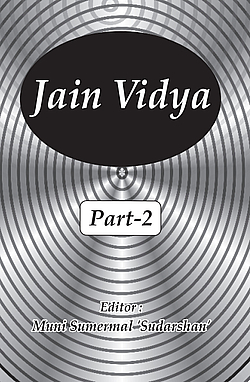NINE CATEGORIES OF TRUTH: AN ANALYSIS
(An Allegorical Presentation)
Jiva can be illustrated by a pond and ajiva by a non-pond. Punya (beneficial karma) and papa (harmful karma) are like the water that flows into the pond. Ashrava is an inlet or passage of a pond and the blocking factor is samvara. To let the water come out through an outlet is called nirjara. The water collected in the pond is bandha. The empty pond is moksha.
1-2 Jiva-Ajiva (Sentient and non-sentient entities)
These are the two real entities or categories of truth. The remaining categories of truth are their manifestations or states. The states of jiva and ajiva undergo transformations. Nevertheless their original qualities i.e sentience or non- sentience can never get destroyed just as gold being broken and moulded into different forms, remains intact in its originality. Only its forms change.
3-4 Punya-Papa (Beneficial karma and harmful karma)
Punya (beneficial karma) and papa (harmful karma) are like salubrious and insalubrious diets. As the lack of salubrious diet and excess of insalubrious diet trigger the disease in ajiva and diminish his state of good health. When salubrious diet is taken more, healthy state retains and health is improved. Death occurs in the absense of both the types of food. In the same way, when jiva's punya (beneficial karma) is more and papa (harmful karma) are less, pleasure increases and pain diminishes and when papa karmas are more, pain increases and pleasure diminishes. When both his punya and papa are eliminated, it results in the attainment of liberation.
5. Ashrava (Inflow of the Karmic Particles to the Soul)
- Just as a pond has an outlet, a house has a door and a boat has a hole, similarly a jiva has ashrava.
- Just as a pond and its outlet, a house and its door and a boat and its hole are one, similarly a jiva and its ashrava are also one and the same.
- That by which water comes in is called an inlet, that by which a man enters is called a door, that by which water flows in is a hole, similarly that by which karma comes is called ashrava.
- Just as water and its inlet, man and door, water and hole are two, similarly, karma and its inflow are two.
- That by which water comes in is a channel but water is not a channel, that by which man comes in is a door but man himself is not a door, that by which water enters in boat is a hole but water in is not a hole, similarly, that by which karma flows in is ashrava but karma is not ashrava.
6. Samvara (Stopping the inflow of karmic particles)
Just as the outlet of a pond is blocked, the door of a room is shut and the hole in a boat is shut, similarly, when the inflow of karmic particles to the soul is stopped it is called samvara.
7. Nirjara (falling of karmic particles)
Just as the water of a pond is made to gush out through an outlet, the dust and rubbish in a room are swept out through the door and the water that comes into a boat is thrown off, Similarly, purifying the soul by separating it from the karmic layers through spiritual practices is called nirjara (falling off karmic particles).
8. Bandha (bondage)
just as sesame seed and oil, butter and milk, metal and mud are blended together, in the same way the blend of jiva and karma is called bondage.
9. Mokhsa (liberation)
just as the oil is separated from the oil seeds by means of a crusher, ghee is separated from curd by a churning stick and metal is separated from the mud by fire, in the same way when a karma is extricated from jiva by self-restraint and austerities, is moksha.
Questions:
- To what has ashrava being compared?
- What is bandha called?
- Are the soul and the ashrava one or two?
